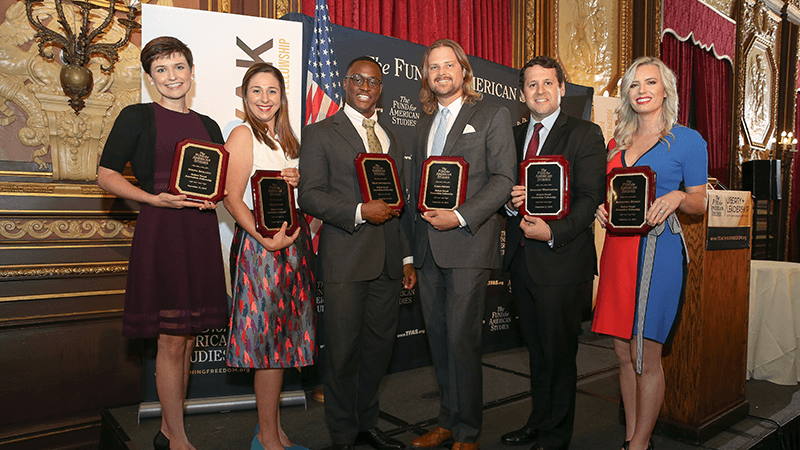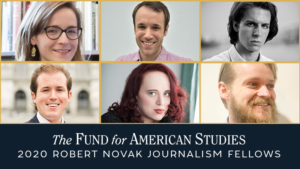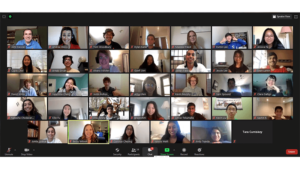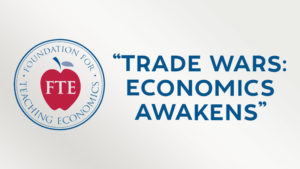
We hope you enjoy these top news stories about TFAS activities, alumni and events this week. Please visit us on social media for additional up-to-the-moment TFAS news and information and sign up to receive weekly updates.
TFAS alumni, staff and faculty continue to make headlines. Read news, analysis and updates by visiting this week’s “Quick Links.”
TFAS Welcomes Leading Early-Career Journalists to 2020-21 Robert Novak Journalism Fellowship
The Fund for American Studies (TFAS) is pleased to announce the recipients of the 2020-21 Robert Novak Journalism Fellowship. The five selected journalists include Christian Britschgi, Tara Burton, Dimitri Simes, Lyman Stone and Julia Yost. Charles McElwee will also join the cohort as the recipient of the John Farley Memorial Fund Alumni Fellowship, which was renamed early this year to honor TFAS friend and former colleague, the late John Farley.

The annual Robert Novak Journalism Fellowship provides early-career journalists with the opportunity to pursue year-long projects on topics surrounding the principles of a free society through both partial and fully-funded grants. Director of the Fellowship, Dan McCarthy, believes that this year’s program comes at a time in our nation when protecting honest and fact-based journalism is crucial.
“The Novak Fellowships are a source of hope and renewal at a time when American journalism is in crisis,” McCarthy said. “Young journalists with a commitment to reporting the facts face a daunting environment, but the Novak program is a lifeline. In the spirit of Robert Novak himself, our fellows tell truth to power and uncover stories that are too often overlooked or misunderstood.”
Learn more about the Fellowship and meet the 2020-21 Fellows at TFAS.org/Novak20.
Students Learn Economic Way of Thinking in Online Summer Programs
Starting in late March, as college campuses and hotels scheduled to host TFAS high school programs began closing and cancelling in-person programming, TFAS quickly determined that we would need to pivot and offer virtual programs to fulfill our vital mission and reach young minds with the “the economic way of thinking.”
Fortunately, TFAS high school division, the Foundation for Teaching Economics (FTE), already had experience with online learning, so adapting to the new COVID-19 virtual learning environment was seamless.

By the start of summer, TFAS launched a fully-virtual version of the Economics for Leaders student program for high school sophomores and juniors. It soon became clear that the inability to host in-person events due to closures and travel restrictions became a catalyst for more creative programming, rather than a hindrance.
FTE Executive Director Ted Tucker reported that our programs overcame concerns that online education could not rise to the challenge of maintaining student engagement.
“One proxy for student engagement is the level of attrition and no-shows. While many school districts reported significant no-shows this past spring, our attrition rate was less than 1%. Of the 601 students enrolled in our virtual summer economics courses, only two dropped out.”
The program’s rapid pivot to an online-only approach focused on maintaining effective interactive pedagogy. Instead of offering a fully asynchronous format, which limits student interaction, FTE created highly interactive “live” weeklong synchronous courses, where students could build community, interact and learn from peers as well as instructors. Through the creative use of the Zoom web conferencing platform, as well as the interactive applications Pear Deck and MobLab, instructors recreated FTE economics activities for the virtual classroom.
Learn more about FTE’s summer programs at TFAS.org/FTESummer20.
TFAS President Roger Ream Calls for a Return to Critical Thinking on the 50th Anniversary of the Op-Ed Page
Last month marked the 50th anniversary of the op-ed page, which originally made its debut on Sept. 21, 1970, in The New York Times — op-ed meaning the page opposite the editorial page. TFAS President Roger Ream ’76 writes in the Washington Examiner how today, competing ideas are no longer celebrated in the media, but instead are shut down.
He explains: “Back then, the Times presented the page’s creation ‘as a move to open the opinion pages to the voices of others, presenting a range of views on major issues. Some are written by prominent thinkers with a deep knowledge on a particular subject, and some are written by a new voice with a unique view.'”
Ream continues to share how “today’s media landscape has outlets like The New York Times leading the way toward the wholesale elimination of dissent.”
The problem with this trend toward closed-mindedness and censorship of ideas deemed disagreeable is that diversity of opinion and honest political, legislative, and cultural battles over important issues are precisely the building blocks of strength and stability that have allowed the United States to thrive for almost 250 years. As a nation, we need robust op-ed pages in newspapers to debate the issues of the day and air diverse opinions in order to find the right answers. – Roger Ream, the Washington Examiner
He cites examples in recent events of media outlets including The Times taking strides in the opposite direction. Explaining how rather than giving a space for dissenting views and creating open dialogue, they have closed their doors to new ideas, become intolerant, and even “cancelled” editors who dare publish unpopular opinions.
To read the full piece, visit the Washington Examiner. On Thursday evening, Ream shared more insight from his article on TFAS alumnus Dan Proft’s ’93 The Dan Proft Show. Listen here.
Economics Lesson of The Week: Trade Wars – Economics Awakens
TFAS continues to provide resources to help teachers and parents continue the important task of educating our nation’s future leaders. We are continuing our “Economics Lesson of The Week” series to feature another new lesson from our high school programming division – the Foundation for Teaching Economics (FTE).
 This week’s lesson is “Trade Wars – Economics Awakens.” In this lesson, students will explore the concepts of international trade, trade barriers, balance of trade and public choice theory. Through a comprehensive lesson plan and related classroom activities, students will learn why economists generally agree that voluntary trade leads to mutual gains. While there are individuals who are adversely impacted by international trade, there are more “winners” than “losers,” and despite disagreements on specific issues with international trade, most economists believe that beginning a trade war where one country imposes a barrier followed by the other country retaliating with its own barriers is a dangerous economic policy.
This week’s lesson is “Trade Wars – Economics Awakens.” In this lesson, students will explore the concepts of international trade, trade barriers, balance of trade and public choice theory. Through a comprehensive lesson plan and related classroom activities, students will learn why economists generally agree that voluntary trade leads to mutual gains. While there are individuals who are adversely impacted by international trade, there are more “winners” than “losers,” and despite disagreements on specific issues with international trade, most economists believe that beginning a trade war where one country imposes a barrier followed by the other country retaliating with its own barriers is a dangerous economic policy.
TFAS offers a plethora of online lesson plans, readings, handouts, video demonstrations and hands-on activity guides to teach the “economic way of thinking” in engaging and relatable ways. Visit TFAS.org/FTELessons for a one-stop guide to our available resources.
Post of the Week
TFAS Public Policy Fellow Calvin Blaylock, PPF ’20, shares his excitement for the 2020-21 TFAS Public Policy Fellowship in a post on LinkedIn.
QUICK LINKS
Leah Trotman ’18 is featured in a U.S. News and World Report piece on the impact of the COVID-19 pandemic on public health studies.
Heather DeSantis ’10 discusses the importance of social media and media pitching during the coronavirus crisis in Brand Experience Magazine.
Sarah Sicard ’13 discusses a recent Twitter poll of Army work-life balance in the Air Force Times.
Faysal Itani ’03, ’06, shares thoughts on how to fix Lebanon’s political crisis in a piece for Vox.com.
Barbara Smith ’05 is an adjunct professor of law at the Washington University in St. Louis School of Law in addition to being a partner at Bryan Cave LLP.
Naomi Schaefer Riley, Novak ’01, discusses the importance of enforcing foster care time limits during COVID-19 in a piece for City Journal.
Erin Mundahl, Novak ’16, discusses the Governor of Wyoming’s response to the Endangered Species Act in a piece for Western Wire.
John McCormack, Novak ’11, reflects on Pres. Trump’s campaign message about Roe v. Wade from the 2016 presidential debates in light of the recent Supreme Court vacancy in a piece for National Review.
Mark Hemingway, Novak ’02, warns about chaos of mail-in voting for the November election in RealClearPolitics.
Matt Continetti, Novak ’08, discusses what’s at stake in the 2020 presidential election following the death of Justice Ruth Bader Ginsburg in a piece for National Review.
Haley Britzky ’16 writes for Task & Purpose on diversity efforts within the Army.
Eric Tanenblatt ’87 is quoted in the Atlanta Business Chronicle about a new Georgia-based nonpartisan coalition to promote safe and fair elections in the state.
Mollie Hemingway, Novak ’04, shares pros and cons of President Trump’s top three contenders to fill the recent Supreme Court vacancy in The Federalist.
Timothy Carney, Novak ’03, discusses the importance of the electoral college in a piece for the American Enterprise Institute.
Robby Soave, Novak ’17, writes about CDC restrictions for Halloween this year in a piece for Reason.
Jennifer Kabbany, Novak ’02, shares top 10 best and worst universities for free speech in America in The College Fix.
Leah Libresco Sargeant, Novak ’18, discusses the dangerous effects of new Netflix show “Cuties” in The American Conservative.
Cheryl Chumley, Novak ’08, shares how the city of Philadelphia has reacted to COVID-19 in The Washington Times.
Connect with @TFASorg on social media!

